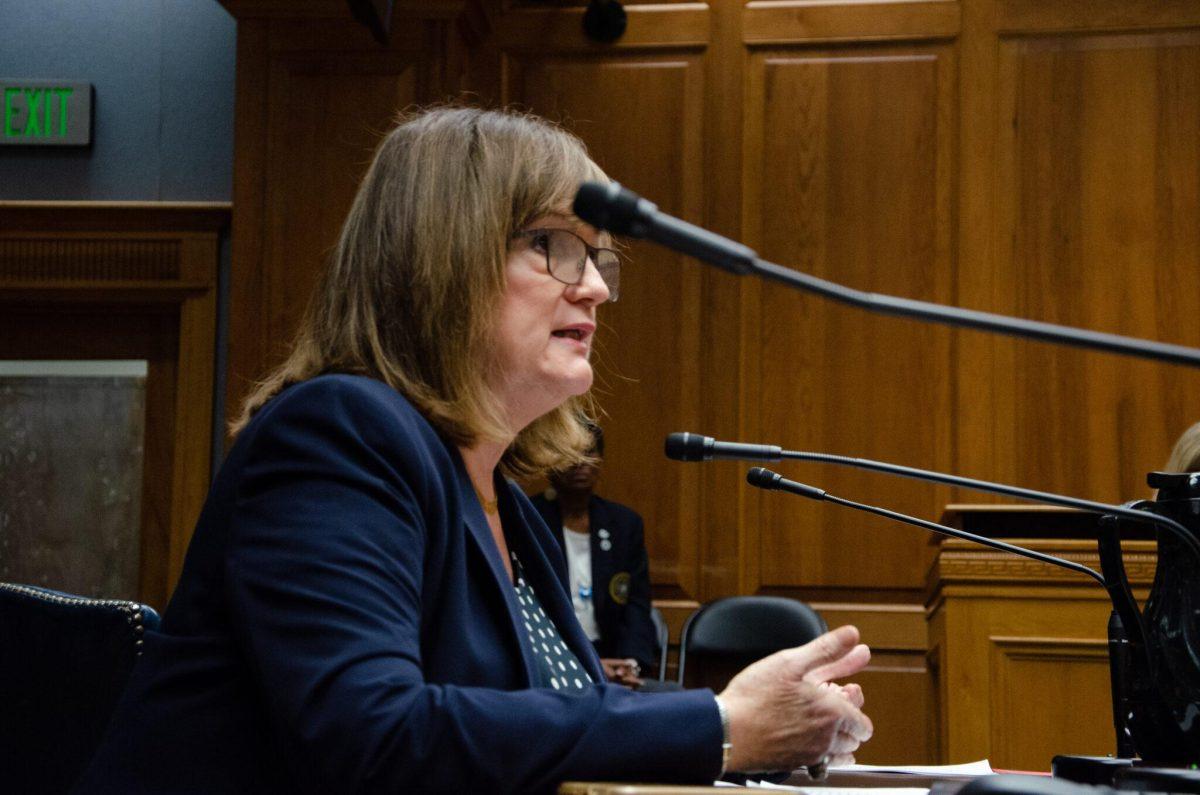Note: Click here to see the Louisiana Illuminator’s original reporting.
The president of the Louisiana Community and Technical College System did not mince words Wednesday while testifying on a resolution that requested all public schools in the state — K-12 and colleges — submit reports on programs and activities related to diversity, equity and inclusion, critical race theory and social emotional learning.
“At its core, this is a racist instrument,” LCTCS President Monty Sullivan said.
House Resolution 13, sponsored by Rep. Valarie Hodges, R-Livingston, was deferred in the House Education Committee on a 6-5 vote, killing it for the session. Republican Reps. Vincent St. Blanc of Franklin and Barbara Freiberg of Baton Rouge joined Democrats in opposing the instrument.
When asked to define critical race theory, Hodges initially pushed back, arguing the term means different things to different people. She eventually said it means “people teaching that one race is superior or inferior to another or that some people are advantaged because of the color of their skin.”
Hodges also falsely claimed LSU has a critical race theory department. No university in the state has such a department, Commissioner of Higher Education Kim Hunter Reed said.
Critical race theory is a decades-old academic concept that, at its core, posits that racism is not just an individual bias but something embedded in legal systems and policies. It is not taught in Louisiana elementary and secondary schools.
“You’re asking people of color to justify why they need resources spent on them,” Sullivan said, visibly upset. “We’re spending money on people of color because they need to be able to go to work. They need to have skills to be able to go to work. And this is the conversation we want to have?”
“Diversity, equity and inclusion is a fact of life,” Sullivan added. “Some of us have come to realize that already. Others of us have not.”
Sullivan’s comments offended some conservatives on the House Education Committee.
“I am not a racist and I don’t appreciate being called one,” Hodges said in response. “I don’t understand the anger over this because we’re simply asking how much is being spent.”
Hodges’ resolution comes amid a nationwide Republican movement to clamp down on curricula and perceived “wokeness” in education.
In Louisiana, that has meant attempts to restrict certain library materials and crack down on tenure for college faculty.
Louisiana has resisted most attempts to push these controversial restrictions. In other southeastern states where Republicans control the legislatures and the governor’s seat, the effort has been more intense.
Georgia and Florida have created controversial post-tenure review systems. In Georgia, higher education leaders described the measure as “the death of tenure.”
Last week, Texas banned diversity, equity and inclusion offices at public schools and passed a budget that defunds DEI programs. Florida also banned DEI initiatives after Gov. Ron DeSantis requested details on how colleges spent money on such programs.
DeSantis also got a shoutout from Sullivan.
“The little man in Florida does not drive policy in Louisiana,” he said.
Sullivan was not the only higher education leader to push back on the premise of Hodges’ resolution.
Jim Henderson, president of the University of Louisiana System, said its nine campuses could only complete their mission in an environment that respects academic freedom. Diversity, equity and inclusion are necessary to serve the UL System’s 90,000 students, who come from a variety of diverse backgrounds, he said.
“If the question to us is how much money are we spending erecting ideological commissariats or pursuing an institutional doctrine or neo-Marxist indoctrination, I can answer that question for you today… the answer is not one penny,” Henderson said, referencing a resolution the Louisiana Republican Party’s State Central Committee approved last month.
Reed, the state higher education commissioner, pointed out inclusion also encompasses disabled students, veterans, nontraditional students and women.
“This is not a blame game, a shame game… this is real life,” Reed said.
Ethan Melancon, representing the Board of Elementary and Secondary Education, said the board opposed Hodges’ resolution because it creates a bureaucratic burden and provides no solid definitions of diversity, equity and inclusion, critical race theory or social emotional learning.
Melancon also raised concerns that a copy of the report Hodges sought would be transmitted to the House Appropriations Committee, pointing out the legislature cannot cut constitutionally protected K-12 funding if they don’t like what the report says.
Andres Vasquez, director of governmental relations for the LSU Student Government Association, spoke in opposition to the bill, arguing it could have a chilling effect on free speech.
“If the students don’t have a professor that can freely include all the views in the classroom, then we’re not getting a quality education,” Vasquez said.
The system presidents did not oppose the resolution and said they would comply with the request if approved.
No administrators from LSU or Southern, the state’s other two university systems, spoke on the resolution.
Louisiana community college leader blasts resolution requesting diversity spending report
June 1, 2023
Rep. Valarie Hodges proposed a bill to collect information on diversity programs and race-related teaching.
More to Discover












